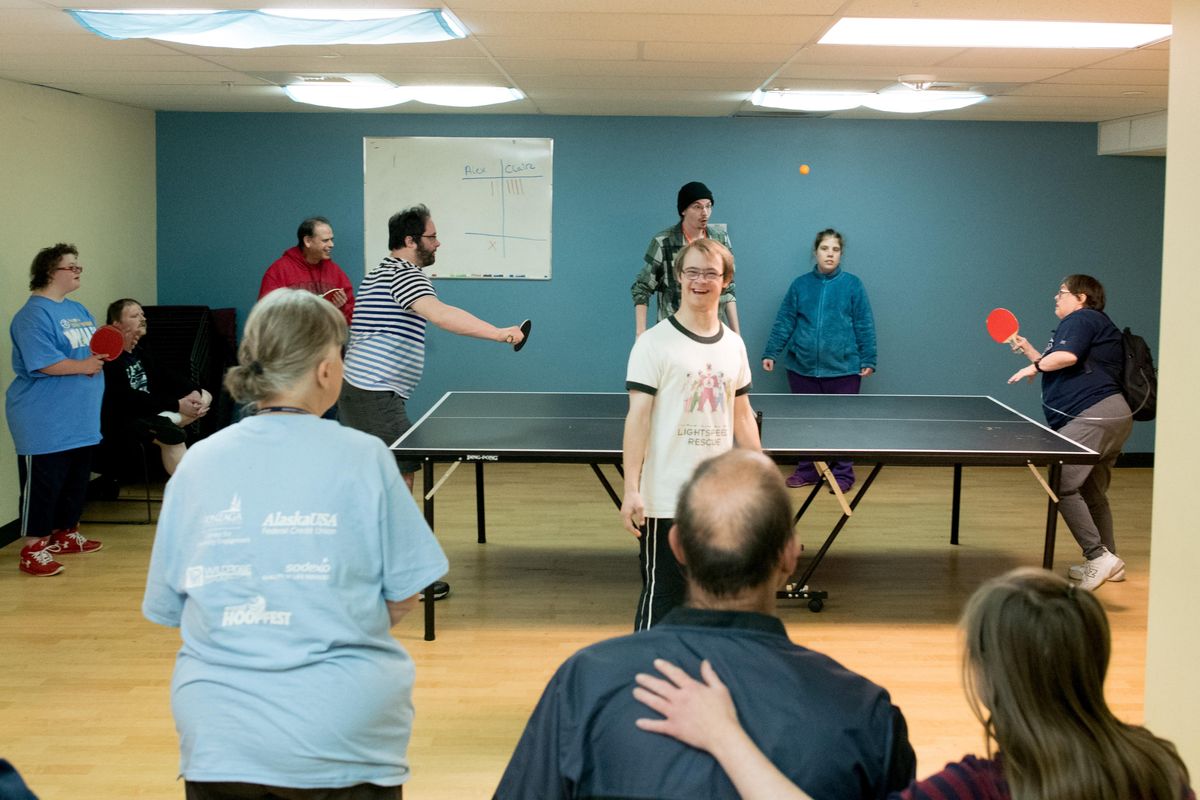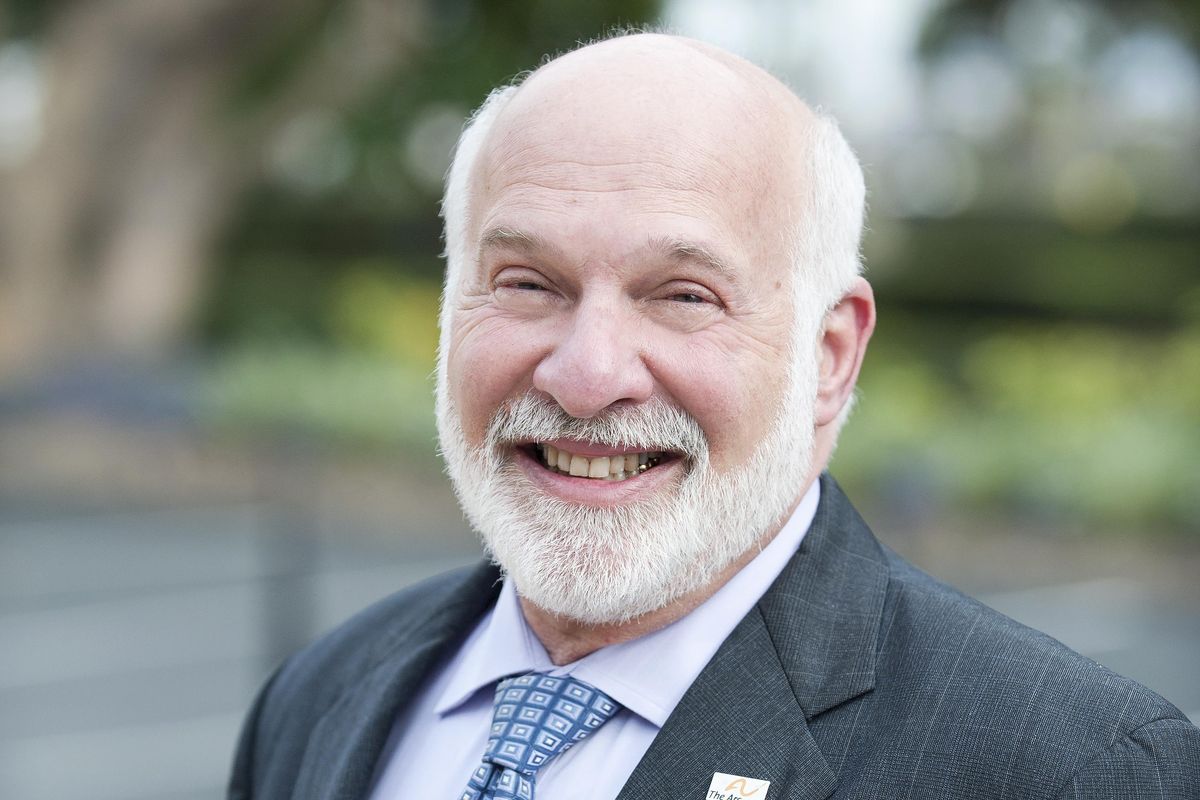Arc-sponsored conference focuses on looming issues for the disabled
Aaron Dwright, center, smiles as Alex McGarry, left, plays Claire Burdick at pingpong on Wednesday, Oct. 17, 2018, at the ARC of Spokane community center. The Arc is hosting a conference with the national Arc CEO, Peter Berns, on Thursday. (Tyler Tjomsland / The Spokesman-Review)Buy a print of this photo
It’s a looming issue in Spokane and nation – about 1 million U.S. families include parents in their 60s or older who care for an adult child with intellectual or developmental disabilities.
Often, the families lack a formal plan for future caregiving if something happens to those parents. Today, other challenges still face this population. High school graduation rates lag at about 50 percent. Only 25 percent of eligible U.S. families know about or seek government services.
“There are families who are grappling with issues of their children getting services needed in school, and facing challenges as they transition to adult life,” said Peter Berns, CEO of the U.S. Arc organization who speaks Thursday in Spokane.
And regarding senior caregivers, he said, “There’s a real crisis looming on the horizon for all these folks for which there are no future plans.”
Berns will discuss those challenges at a conference called “A Courageous Conversation,” a public forum to bring forth ideas for local initiatives. The Arc works to promote the rights of people with intellectual and developmental disabilities. It has more than 600 chapters, including in Spokane.
Themed “Let’s Create Change,” it’s a free event held by the IDD Champions Network, a 2-year-old Spokane coalition of 25 nonprofits, government agencies, Arc of Spokane and parent advocates for the disabled and their families.
The day will include Berns’ keynote, a Q&A session and facilitated small-group discussions to brainstorm community steps.
“There has been tremendous progress, but we still have a long way to go to truly achieve this vision of people with disabilities – whether children or adults – being fully included in their communities and able to partake in what life has to offer,” Berns said.
“We’ll spend time reflecting on history and all the progress we’ve made to improve life opportunities, then take a look at where things are, and we’ll talk as a group about where do we go from here.”
The topics might include school services, graduation rates, finding and retaining jobs, housing and support for adults with disabilities if they desire to establish independent lives.
“Employment has evolved to where today we have people with disabilities employed in all kinds of jobs, but there is still very high unemployment,” he said.
“There is only about 25 to 35 percent of adults with intellectual and developmental disabilities who are employed at all, either full or part time across the nation. We did a study that found among those who were employed, on average, they were only working about 13 hours a week.”
Other challenges surround better support for families in caregiver or guardian roles. Sima Thorpe, executive director for Arc of Spokane, said only a small percentage of people in the state tap the government services that they are eligible to receive.
“We estimate there are 100,000 (statewide) who could be eligible for developmental disabilities services,” she said. Currently on the caseload are about 44,000 people. “Of that 44,000, only 14,500 do not get services and are on a waiting list.
“It’s a huge problem here; access to government services that people are eligible for is very low for Washington state. Many of us assume the state is very progressive in terms of social services, but regarding children with intellectual and development disabilities, we are behind.”
Part of the issue is that some families never applied for services many years ago, Thorpe said. If aging parents try to get support now for a much older adult child, she added, that typically means long delays on waiting lists.
“How we see this play out at the Arc is parents will come in who are starting not to be able to care for their loved one with a developmental disability and are trying to look for solutions,” she said.
“Their loved one may now be in their 40s or even 50s, and they’ve never applied for services for that person, so they’re starting out. There are long waiting lists with difficulties in establishing eligibility, and it breaks our heart because the road ahead of them is going to be tough.”
The Arc of Spokane urges families to start start applying to access services during middle school, when children with disabilities are 14 to 21.
Because many years ago children with disabilities were typically institutionalized, the state has required waivers for parents who want to care for a child in the home, she said. Today, the state has a varied menu of services depending on needs, with different applications.
“This is a complicated world in terms of access to services,” Thorpe said. “It takes a whole lot of education for families around those services and to understand their rights.”
Thorpe, co-founder of the IDD Champions Network, expects 150 to 200 people at the conference. Members include parents, the Arc, Skils’kin, Goodwill Industries, Department of Social and Health Services, and university members.
Organizers hope the many organizations can work together on changes. The network will write a report after the conference to give out to participants and community leaders.
“This network is the first of its kind that is bringing community leaders and other advocates together,” Thorpe said.
“With the CEO of Arc coming to our region, this is a great opportunity for us to think about these national issues Dr. Berns will be talking about, how do these manifest themselves locally, and how do we tackle those issues together?”
Thorpe said Berns is expected to touch on three primary issues: A “silver tsunami” among caretakers or guardians, low access to services, and how the employment and policy sectors affect people with disabilities and their families.
Berns might touch on other national issues while in Spokane. Those include protection of the Affordable Care Act, he said, and continued support for Medicaid as the single largest source of funding for home- and community-based services such as a personal care attendant.
“We’ll be talking about next steps,” Berns said. “I’m not professing to come into Washington state with all the answers. This conference is to promote dialogue.
“What we know from the history of Arc is the solutions really come in local communities as they organize to take action.”

